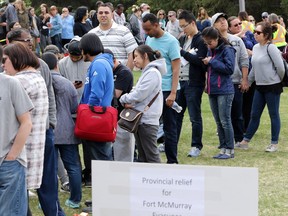Province zeroes in on mental health impacts of wildfires

Article content
The province is stepping up to reduce the mental trauma of those who’ve fled Fort McMurray’s wildfires and others who fought them, Alberta Health Minister Sarah Hoffman said Friday.
She said the flames that consumed 10 per cent of Fort McMurray and the resulting desperate exodus of nearly 90,000 people will result in long-lasting mental health consequences.

“We do expect there will be needs for support for years to come,” said Hoffman.
“Our studies show there’s a four to five-year cycle to truly process these kinds of incidents.”
Some of the data for those studies was collected in the aftermath of the 2011 Slave Lake fire and the flooding that inundated parts of southern Alberta two years later, she said.
Hoffman was responding to concerns voiced by Liberal leader Dr. David Swann that the province is ill-equipped to handle a large surge of mental trauma cases following last week’s devastation.
The Calgary-Mountain View MLA who co-chaired the province’s mental health review released last January said Alberta was under-performing on the issue prior to the latest crisis.

“I don’t see any evidence there’s new resources, new personnel,” he said.
“We don’t have a workforce widely-trained so it makes me anxious.”
He said the government should look outside the province for help.
“I want to know what requests we’re making of the federal government on this,” said Swann.
Dealing proactively with mental health problems that would include post-traumatic stress disorder would take the pressure off hospitals and head off consequences like alcoholism, family violence and suicide, he said.
It’s important the treatment be publicly-funded to ensure all those in need receive it, said Swann.
Hoffman said the province has increased the mental health portion of its health budget by $5.6 million this year, adding three different medical care lines are available to evacuees.
And Hoffman said the province has reached out to experts outside its boundaries.
“Everyone wants to help out, including a number of experts across the country and Alberta,” she said.
First responders who’ve endured prolonged exposure to trauma have been offered the assistance of critical stress management teams that include trained specialist and peer support, said Hoffman.
Currently, teams of stationary and roving mental health professionals have been assigned to evacuee reception centres, she added.
“Alberta Health and Alberta Health Services take this very seriously … a mental health network is offering pro bono care,” said Hoffman.
In the months following the 2013 southern Alberta floods, Alberta Health Services closely monitored its psychological effects, notably by tracking prescription drugs purchased to alleviate stress.
In monitoring the town of High River, they found the use of pharmaceuticals rose, partly in response to anxiety and depression, though some of that might have resulted from loss of access to the drugs left behind in flooded homes.
On another evacuee health front, AHS reported 47 people staying at reception centres at Mount Royal University and the University of Calgary were suffering gastrointestinal illness.
It’s to be expected with people living in close quarters and it’s believed the situation is under control, said Dr. Jason Cabaj.
“It can spread quite quickly but it appears what we’ve done to try to control it has been pretty successful,” he said.
The illness hasn’t led to any hospitalizations but some patients have been asked to spend most of their time in their rooms to prevent the virus from spreading, said Cabaj.
Twitter/BillKaufmannjrn






Postmedia is committed to maintaining a lively but civil forum for discussion. Please keep comments relevant and respectful. Comments may take up to an hour to appear on the site. You will receive an email if there is a reply to your comment, an update to a thread you follow or if a user you follow comments. Visit our Community Guidelines for more information.